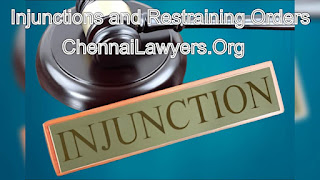Civil disputes are disagreements between individuals or entities that do not involve criminal charges. These disputes can encompass a wide range of issues, from property ownership to contract breaches. In such situations, the law provides various remedies to protect the rights and interests of the parties involved. Two important legal tools employed in civil disputes are injunctions and restraining orders. This article, brought to you by ChennaiLawyers.Org, will delve into these concepts, explaining their uses and distinctions.
Injunctions and Restraining Orders: Legal Remedies in Civil Disputes
Understanding Injunctions
An injunction is a court order that compels a party to either perform a specific action (mandatory injunction) or refrain from taking a particular action (prohibitory injunction). It acts as a preventive measure, safeguarding a party's rights from potential harm. Injunctions are typically issued when monetary damages are deemed inadequate to address the situation.
When are Injunctions Used?
Injunctions find application in a diverse range of civil disputes. Here are some common scenarios:
- Property disputes: If a property owner fears imminent trespass or unauthorized construction on their land, they can seek an injunction to halt such activities.
- Contract breaches: When a party breaches a contractual obligation, and the consequences can be severe, an injunction can be sought to enforce the terms of the contract. For instance, if a company is contractually bound to maintain exclusivity in selling a product but attempts to sell it elsewhere, an injunction can be obtained to prevent them from doing so.
- Intellectual property infringement: Copyright, trademark, and patent violations can be addressed through injunctions. If someone is using your intellectual property without authorization, an injunction can be used to stop them.
Types of Injunctions
There are two primary types of injunctions:
- Preliminary injunction: This is a temporary order issued before a final trial to preserve the status quo and prevent potential harm. It is granted based on the likelihood of success on the merits of the case and the potential for irreparable harm if the injunction is not issued.
- Permanent injunction: A permanent injunction is a final order issued after a trial that permanently prohibits or compels a specific action. It is granted only if the court finds in favor of the party seeking the injunction.
Restraining Orders vs. Injunctions
Restraining orders are often used interchangeably with injunctions, but there are subtle distinctions between the two. Restraining orders are typically issued in emergency situations involving domestic violence, harassment, or stalking. They are designed to protect an individual from immediate harm and are often granted ex parte (without notice to the other party). Injunctions, on the other hand, are generally issued in civil disputes after both parties have had a chance to be heard in court.
Obtaining an Injunction
The process of obtaining an injunction can be complex. It typically involves filing a lawsuit, presenting evidence to the court demonstrating the need for an injunction, and convincing the court that you are likely to succeed on the merits of your case. An experienced lawyer can guide you through this process and ensure that your application for an injunction is properly presented to the court.
FAQs
- Can I get an injunction without a lawyer?
While it is technically possible to obtain an injunction without legal representation, the process is intricate and requires a strong understanding of the law. An experienced lawyer can significantly increase your chances of obtaining a favorable outcome.
- What happens if I violate an injunction?
Violating a court order, including an injunction, can have serious consequences. You could be held in contempt of court, which could result in fines or even jail time.
- How long does an injunction last?
The duration of an injunction depends on the type of injunction issued. Preliminary injunctions are temporary, while permanent injunctions are typically in effect until the underlying dispute is resolved.
Conclusion
Injunctions and restraining orders are valuable legal tools that can help protect your rights and interests in civil disputes. If you are facing a situation where you believe an injunction may be necessary, consulting with a qualified lawyer at ChennaiLawyers.Org is crucial. They can assess your specific circumstances, advise you on the appropriate course of action, and guide you through the legal process. By seeking legal counsel, you can ensure that your rights are protected and that you receive the remedy you deserve.
Read More
- Chennai Employment Law: Probation, Confirmation, Termination
- Chennai Family Court: A Comprehensive Guide to Family Law Proceedings
- Adoption Laws in Chennai: Navigating the Legal Process
- Personal Injury Claims: Seeking Compensation in Chennai
- Navigating Chennai's Legal Landscape: A Comprehensive Guide
- Ministry of Law and Justice website:

